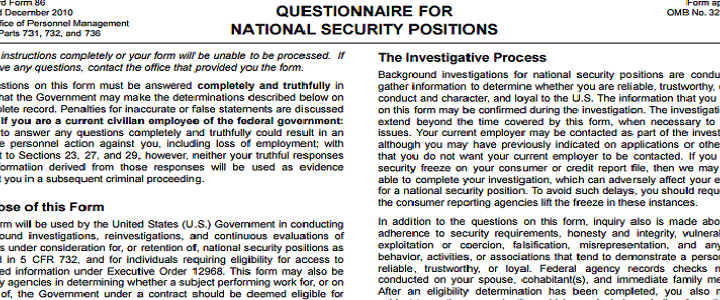In a turn of events that can only be characterized as troubling, a congressional candidate has learned that her SF-86 questionnaire – a standard form required for national security positions – has been shared with the media. Abigail Spanberger, the Democratic candidate challenging Representative Dave Brat of Virginia, submitted the SF-86 when she applied for a job within the federal government. As anyone who has filed an SF-86 knows, the contents of the SF-86 are equivalent to baring one’s soul as part of the process to be considered for a national security position within the U.S. government.
Further investigation showed the SF-86 was in the hands of the Congressional Leadership Fund, a super PAC supporting Republican candidates.
How did a super PAC get hold of Spanberger’s SF-86?
The New York Times tells us that the PAC denies their role in the acquisition, yet their actions demonstrate their possession. The PAC alleges that “America Rising,” a Republican-aligned research firm submitted the Freedom of Information Act (FOIA) request as part of their opposition research on candidates.
While entirely logical, what isn’t clear is how the SF-86 was allowed to be released under FOIA. The timeline provided by the Congressional Leadership Fund, and confirmation they have the SF-86, provides some illumination.
- On July 9, 2018, America Rising Corp. submitted a FOIA request to the National Personnel Records Center “for access to certain records contained in the official civilian personnel file of former federal employee Abigail Spanberger. Specifically, this request seeks records reflecting Ms. Spanberger’s employment dates, annual salaries, title, and position description.”
- By letter dated July 12, 2018, National Personnel Records Center/National Archives and Records Administration forwarded the America Rising Corp. request to the USPS.
- On July 30, 2018, USPS responded to America Rising’s request with their complete personnel file (“entire official personnel folder”), which included Spanberger’s SF-86.
What makes this particularly interesting is that Spanberger, in addition to having once been employed by the USPS, is also a veteran of the Central Intelligence Agency. We don’t know if America Rising made the same request of the CIA.
Who’s to blame?
Social networks are rife with explanations and accusations on how this could come to pass. Theories range from the current administration purposefully sharing the document in its war on the Intelligence Community – to the Chinese providing it from their hack of the OPM database. There is zero evidence to support these claims.
Mark S. Zaid, an attorney who represents a number of individuals with Intelligence Community backgrounds noted in his tweet on the subject that errors occur from time to time, but that no third party should ever receive the SF-86.
No third party would ever receive ANY part of SF-86 via #FOIA. I have seen agencies mistakenly release SF-86s to third parties believing privacy waiver existed. I suspect incompetence caused this screw-up but an investigation is warranted & necessary. https://t.co/piS93QVfWp
— Mark S. Zaid (@MarkSZaidEsq) August 28, 2018
The postal service+Freedom of information act=Hot Mess
From this seat, it appears the explanation is clear: the USPS screwed up.
The USPS should have answered the questions and not provided the entire personnel file. If the file was to be included, the SF-86 should have been removed. The SF-86 is rife with personal identifying information (PII) to include social security number, next of kin, travel history, history of narcotic use (if any), any criminal entanglements, personal finances, prior employment, etc.
There is inconsistency within the USPS. In 2015, the USPS denied a FOIA from MuckRock for information. The USPS noted that to do so would violate the privacy of the named individuals.
The USPS needs to review their FOIA process.
We reached out to MuckRock’s JPat Brown and inquired as to the amount of time a FOIA request takes with the USPS. We were told that it is in excess of 100 days and that agencies go through great pains to NOT share the SF-86 or similar information.
https://twitter.com/resentfultweet/status/1034787946682109953
Spanberger’s Opponents Should Have Known Better
This does not excuse the personnel at the two organizations which had the SF-86 in their hands: America Rising and the Congressional Leadership Fund. They should have recognized the inappropriateness of the inclusion of the SF-86 (given the routine nature of the requests for employment history, etc.), and informed the USPS that the information was included.
As noted, human error does occur – and the responsible action would have been to return the document to the USPS.
That didn’t happen. It should have.




